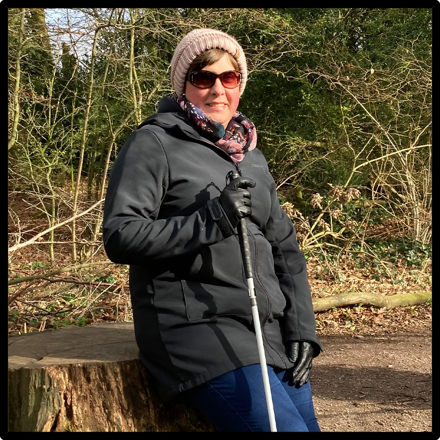“Sight loss does change your life, but it's not the end of your life”
Posted: Tuesday 27 June 2023
Receiving a diagnosis of macular disease can be overwhelming and bring about a whirlwind of emotions. From shock and disbelief, to frustration and sadness, many people struggle to come to terms with the news they are losing their sight.
But, with the right advice and support it is possible to overcome the emotional impact and continue to do the things you love.
In our latest My Macular and Me webinar Kate, Louise and Pat who have all lived with macular disease for several years, shared their tips on dealing with a diagnosis.
Arm yourself with information
Pat was diagnosed with dry age-related macular degeneration (AMD) 21 years ago. Like many others, he had never heard of the condition and didn’t receive any information at the point of diagnosis.
“I left there devastated,” he said. “I thought my world had fallen apart. I had a round trip of 50 miles drive to work, there was no public transport to get me there, I still had a mortgage. I thought ‘how am I going to do this?’ I came home and said to my wife ‘I'm going to go blind.’”
Thankfully Pat’s wife went straight on the internet and found the Macular Society.
“I joined straightaway” he said. “I thought if I’m going to go blind I’m going to be stubborn. I’m going to beat this and I’m going to try and set myself up with all the knowledge and information I can.”
Thanks to this wealth of knowledge Pat has been able to help many other people with macular degeneration, helping them to come to terms with their diagnosis.
He said: “I've done so many different courses of research, so many things I am able to give people loads of information, signpost them to various help agencies and tell them what they don't get told.”
The Macular Society has a wealth of information available, both online and over the phone. Visit macularsociety.org or call us on 0300 3030 111.
Go through the emotional process
Louise, who has Stargardt disease and was diagnosed at the age of 15, agreed that finding out as much as you can about the condition is important, but she also emphasised that it is also essential to grieve.
She said: “I think it's just finding out what you can, but it is going through that whole process of shock, disbelief, anger, rage, frustration, sadness.
“You grieve, but it's very much a cyclical process. It can take quite some time to go through those cycles and to get to a place where you then feel comfortable with it, and it's taking me a long time to get to that place.”
The Macular Society has a range of emotional support services available, including telephone befriending and counselling – find out more on the services we provide.
Join a support group, or speak to others affected
Kate, who was diagnosed with wet AMD more than 20 years ago, was advised by her ophthalmologist to join the Macular Society. Not only did she take his advice but she went on to set up a support group so she could learn from others with the condition.
She said: “I find we learn from each other.
“When people come to our groups, we all give each other tips on what we find helps us.”
Pat, who also runs a local group in Lincoln, agreed with Kate on the importance of peer support.
He said: “It's amazing. I get them to talk about how they’ve overcome things and share what they have done, and other people will say ‘Oh, I think that that's a great idea,’.
“People do things in different ways, but someone will have something you haven't thought about, and it's usually a really good idea.”
Our groups provide information and support to those with macular disease, their family and friends. Find your local support group.
Focus on what you can still do
Louise said: “There's so many different challenges that you face. But there's always ways around it, and I think the important thing to remember is that yes, having a sight loss diagnosis is devastating, and it does change your life, but it's not the end of your life. There is so much you can do. You just have to pivot and change direction. Think about things differently and focus on what you can still achieve rather than what you're not able to anymore.”
And Kate did exactly that, as she shared how she kept up her hobby of playing tennis by using a ball with a bell in it. But, the 77-year-old also took on a new hobby.
She said: “I line dance and that’s a thing I can still do. What I do is I stand next to somebody with big feet, and I follow that because I can't see the teacher.
“If you go wrong, so what?! It doesn't matter. It's exercise, isn't it?”
